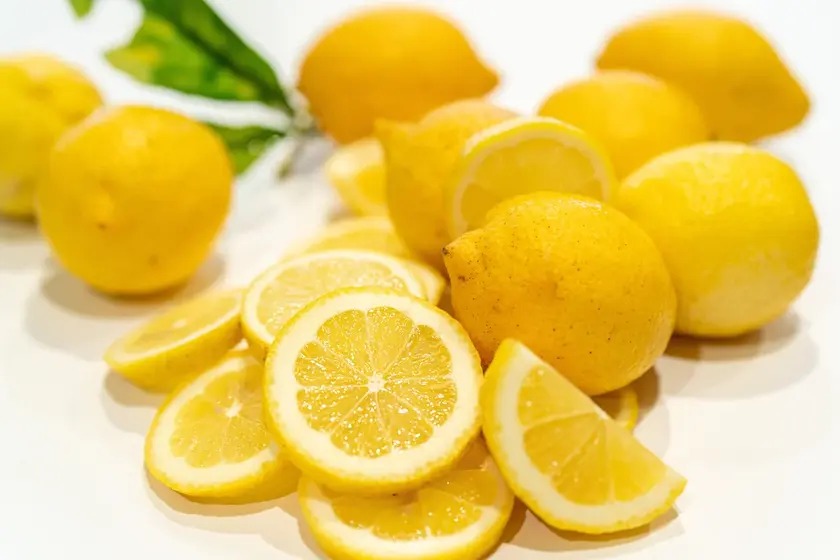Pucker up for a dose of sunshine! Lemons, those vibrant yellow fruits synonymous with tangy flavor, offer more than just a refreshing kick. Recent research suggests they might be a surprising ally for your overall well-being. From boosting your immune system to potentially lowering your risk of chronic diseases, lemons pack a powerful punch in their small package. Let’s delve into the world of lemons and explore the science behind their potential health benefits, along with easy tips to incorporate them into your diet.
Pucker Up for Prevention: Can Lemons Really Help Ward Off Kidney Stones?
Kidney stones, those tiny, jagged minerals that form in the urinary tract, can cause excruciating pain and discomfort. While the thought of sipping lemonade might not be your first line of defense, lemons have emerged as a potential weapon in the battle against kidney stones. Let’s delve into the science behind lemons and explore their potential role in preventing these unwelcome guests.
The Culprit: Understanding Kidney Stones
Kidney stones come in various forms, with calcium oxalate being the most common type. These stones form when calcium and oxalate, a substance found in certain foods, bind together in the urine. When urine becomes concentrated or there’s an excess of oxalate, the risk of stone formation increases.
Lemons: A Citric Ally?
Lemons boast a refreshing sourness thanks to their high content of citric acid. Here’s why citric acid might be a kidney stone deterrent:
- Citrate Inhibition: Citric acid binds to calcium in the urine, potentially reducing the formation of calcium oxalate stones.
- Increased Urine Volume: Lemons are a natural diuretic, encouraging you to produce more urine. This dilution effect helps prevent stone formation by preventing minerals from concentrating and sticking together.
- Reduced Acidity: Highly acidic urine promotes stone formation. Lemons, despite their tart taste, are metabolized into an alkaline substance, potentially creating a less hospitable environment for stone development.
The Evidence: Promising, But Not Definitive
Studies suggest that lemonade consumption might be associated with a lower risk of kidney stones. However, more research is needed to definitively confirm the cause-and-effect relationship between lemons and kidney stone prevention.
Important Considerations: It’s Not All Sunshine and Lemons
While lemons offer a potential benefit, there are a few things to keep in mind:
- Quantity Matters: The amount of lemon juice needed for a potential preventative effect might be more than you’d typically consume in a glass of lemonade. Discuss appropriate intake with your doctor.
- Sugar Concerns: Many commercial lemonades are loaded with sugar, which can contribute to other health problems. Opt for freshly squeezed lemon juice diluted with water or unsweetened lemonade.
- Underlying Conditions: If you have a history of kidney stones or other urinary tract issues, consult your doctor before significantly increasing your lemon juice intake.
The Final Squeeze: Lemons as Part of a Holistic Approach
Lemons, with their potential to increase urine volume and citrate levels, might be a valuable addition to your kidney stone prevention strategy. However, it’s crucial to remember that they are not a magic bullet.
Here’s a well-rounded approach for optimal kidney health:
- Hydration is Key: Drink plenty of water throughout the day to dilute urine and prevent stone formation.
- Dietary Modifications: Limit foods high in oxalate, such as spinach, beets, and nuts.
- Maintain a Healthy Weight: Obesity is a risk factor for kidney stones.
- Consult Your Doctor: Discuss your kidney stone risk factors and prevention strategies with your doctor for personalized guidance.
Lemons can be a refreshing and potentially helpful addition to your kidney health regimen. By incorporating them alongside a healthy lifestyle and consulting your doctor, you can take proactive steps towards a future free from the pain of kidney stones.
Pucker Up for Your Heart: How Lemons Can Support a Healthy Heart
The humble lemon, with its vibrant yellow rind and tart flavor, is more than just a refreshing drink or a zesty addition to your meal. Recent research suggests that this sunshine-colored fruit might also be a friend to your heart. Let’s explore the potential ways lemons can contribute to a healthy heart and how you can incorporate them into your diet.
The Power of Vitamin C: A Heart-Healthy Hero
Lemons are bursting with vitamin C, a powerful antioxidant essential for maintaining good health. Here’s how vitamin C might benefit your heart:
- Fights Oxidation: Vitamin C acts as an antioxidant, neutralizing free radicals that damage cells and contribute to the development of heart disease.
- Boosts Immunity: A strong immune system helps fight off infections that can place stress on the heart. Vitamin C supports immune function by keeping your body’s defenses ready.
- Improves Blood Vessel Function: Vitamin C may play a role in maintaining healthy blood vessel walls, potentially reducing the risk of heart disease.
Fiber for a Healthy Heartbeat
While not as well-known for their fiber content, lemons do contain a small amount of this essential nutrient. Fiber offers several heart-healthy benefits:
- Lowers Cholesterol: Soluble fiber in lemons can help bind and eliminate LDL (bad) cholesterol from the bloodstream.
- Supports Blood Sugar Control: Fiber helps regulate blood sugar levels, which can indirectly benefit heart health.
Plant Power: The Potential of Flavonoids
Lemons contain various flavonoids, a group of plant compounds with potential health benefits. Studies suggest that flavonoids might play a role in:
- Reducing Blood Pressure: Some studies suggest that flavonoids may help lower blood pressure, a significant risk factor for heart disease.
- Reducing Inflammation: Chronic inflammation is linked to various health problems, including heart disease. Flavonoids might possess anti-inflammatory properties.
Important Considerations: A Balanced Approach
While lemons offer promising heart-healthy benefits, it’s important to remember:
- Moderation is Key: Excessive lemon juice consumption could irritate your teeth or stomach. Aim for moderation and consult your doctor if you have concerns.
- Diet and Lifestyle: Lemons are a great addition to a heart-healthy diet, but they are not a replacement for a balanced lifestyle. Exercise regularly, manage stress, and limit unhealthy fats and processed foods.
- Medication Interactions: If you take medication for heart disease, discuss increasing your lemon intake with your doctor, as it could potentially interact with certain medications.
Lemons: A Zesty Addition to Your Heart-Healthy Journey
Lemons, with their vitamin C content, fiber, and flavonoids, can be a delicious and potentially heart-healthy addition to your diet. Here’s how to incorporate them:
- Squeeze Some Sunshine: Add a squeeze of fresh lemon juice to water, sparkling water, or tea for a refreshing and heart-healthy beverage.
- Dress Up Your Dishes: Use lemon juice to add a tangy flavor to fish, chicken, vegetables, or salad dressings.
- Enjoy in Moderation: Remember, moderation is key. Discuss appropriate intake with your doctor
By incorporating lemons alongside a heart-healthy diet and lifestyle, you can take a proactive step towards a healthier future.
Lemons: The Zesty Secret to Boosting Iron Absorption
Iron, a vital mineral, plays a critical role in transporting oxygen throughout your body. However, getting enough iron from your diet and ensuring your body absorbs it effectively can be a challenge, especially for vegetarians and vegans. Here’s where the humble lemon steps in, offering a surprisingly simple way to enhance iron absorption.
The Iron Absorption Challenge:
Iron comes in two forms: heme iron, found in animal products, and non-heme iron, abundant in plant-based foods. While heme iron is more readily absorbed by the body, non-heme iron absorption is less efficient. This can lead to iron deficiency, especially in individuals who rely on plant-based sources for iron.
Lemons to the Rescue: The Power of Vitamin C
Lemons are a treasure trove of vitamin C, a crucial nutrient for iron absorption. Here’s how vitamin C from lemons can be your iron absorption ally:
- Vitamin C Acts as a Chelator: Vitamin C helps convert non-heme iron into a more soluble form, making it easier for your intestines to absorb. This process, called chelation, significantly increases the amount of iron your body can utilize.
- Enhanced Stomach Acidity: Vitamin C can slightly increase stomach acidity, further aiding in iron absorption.
Studies Support the Citrus Squeeze:
Research backs the claim that vitamin C can significantly enhance non-heme iron absorption. Studies have shown that consuming vitamin C alongside iron-rich plant-based foods can improve iron absorption by up to two or threefold.
Lemons: A Simple Solution
Incorporating lemons into your meals with iron-rich plant-based foods is a simple and delicious way to boost iron absorption. Here are some ways to add a lemony twist:
- Citrusy Salads: Include a squeeze of fresh lemon juice to your salad dressing when enjoying iron-rich leafy greens or lentils.
- Lemony Lentil Soup: Lemons add a bright flavor to hearty lentil soups, packing a double punch of iron and vitamin C.
- Citrus-Marinated Tofu: Marinate tofu in a mixture of lemon juice, soy sauce, and spices before pan-frying for a flavorful and iron-rich meal.
Important Considerations: A Balanced Approach
While lemons are a great tool for enhancing iron absorption, keep these things in mind:
- Moderation Matters: Excessive lemon juice consumption can irritate your stomach. Aim for a moderate amount and consult your doctor if you have concerns.
- Partner with Iron-Rich Foods: Lemons work best when paired with iron-rich plant-based foods to maximize absorption benefits.
- Calcium Consumption: Avoid consuming large amounts of calcium-rich foods, like milk or dairy products, with your iron-rich meal, as calcium can hinder iron absorption.
Lemons: A Simple Boost for Your Iron Journey
Lemons, with their readily available vitamin C, can be a powerful tool to improve non-heme iron absorption from plant-based foods. By incorporating this zesty citrus into your meals, you can support your body’s ability to utilize iron effectively, contributing to overall well-being. Remember, a balanced diet and consulting your doctor are essential for optimal iron health.
Pucker Up for Protection: How Lemons Fight Cell Damage
Lemons, the sunshine-colored fruit synonymous with refreshing drinks and zesty dishes, offer more than just a burst of flavor. Recent research suggests that these citrus powerhouses might pack a powerful punch when it comes to preventing cell damage, a key factor in maintaining good health and potentially reducing disease risk. Let’s delve into the science behind lemons and explore how they might help protect your cells from harm.
Free Radicals: The Culprits Behind Cell Damage
Our bodies are constantly bombarded by free radicals, unstable molecules produced during normal metabolism and exposure to environmental toxins. These free radicals can damage cells by disrupting their structure and function. This cellular damage is linked to various health concerns, including:
- Chronic Diseases: Free radical damage is implicated in the development of chronic diseases like cancer, heart disease, and Alzheimer’s disease.
- Premature Aging: Cellular damage contributes to the visible signs of aging, like wrinkles and skin laxity.
Lemons: An Arsenal of Antioxidants
Lemons boast a vibrant array of antioxidants, powerful allies in the fight against free radicals. Here’s how these antioxidants might help protect your cells:
- Vitamin C: A Potent Antioxidant: Lemons are brimming with vitamin C, a well-known antioxidant that directly neutralizes free radicals, preventing them from inflicting damage on cells.
- Flavonoid Powerhouse: Lemons contain a variety of flavonoids, another group of antioxidants that work synergistically with vitamin C to offer additional protection against free radicals.
Studies Shed Light on Citrus Protection
While more research is needed to fully understand the mechanisms at play, studies suggest a potential link between lemon consumption and reduced cell damage. Some studies have shown that diets rich in vitamin C, like those containing lemons, might be associated with a lower risk of certain cancers and age-related diseases.
Lemons: A Delicious Way to Support Cellular Health
Lemons offer a simple and delicious way to incorporate antioxidants into your diet and potentially support cellular health. Here are some ways to add a lemony twist to your day:
- Start Your Day with a Citrus Squeeze: Add a squeeze of fresh lemon juice to your morning glass of water for a refreshing and antioxidant-rich boost.
- Incorporate Lemons into Meals: Dress up fish, chicken, vegetables, or salads with lemon juice for a burst of flavor and a potential antioxidant boost.
- Enjoy Herbal Teas with Lemon: Add a slice of lemon to your favorite herbal teas to enhance the flavor and add a touch of vitamin C.
Important Considerations: A Balanced Approach
While lemons are a valuable addition to a healthy diet, it’s important to remember:
- Diet and Lifestyle: Lemons are just one piece of the puzzle. Maintain a balanced diet with plenty of fruits, vegetables, and whole grains for optimal antioxidant intake.
- Moderation is Key: Excessive lemon juice consumption could irritate your teeth or stomach. Aim for moderation and consult your doctor if you have concerns.
- Consult Your Doctor: If you have any underlying health conditions, discuss incorporating lemons into your diet with your doctor.
Lemons: A Zesty Ally for Cellular Health
Lemons, with their abundant vitamin C and flavonoids, can be a delicious way to support your body’s natural defenses against free radical damage. By incorporating them into your diet alongside a healthy lifestyle, you can take a proactive step towards promoting cellular health and potentially reducing your risk of chronic diseases. Remember, a balanced approach is crucial, and consulting your doctor is essential for personalized guidance on your overall health journey.
Nutrition Facts of Lemon
Lemons are more than just a tart addition to your favorite beverage. This sunshine-colored fruit packs a surprising amount of nutrients into its small package. Let’s explore what a single lemon, without the peel, offers:
- Low in Calories, Big on Vitamin C: One lemon boasts only 17 calories but delivers a whopping 34% of your daily recommended intake of Vitamin C. This essential vitamin supports your immune system and promotes overall health.
- Fiber for a Healthy Gut: Lemons provide 1.6 grams of fiber, aiding digestion and keeping you feeling fuller for longer.
- A Treasure Trove of Micronutrients: In addition to vitamin C, lemons contain small amounts of potassium, vitamin B6, and thiamin, all essential for various bodily functions.
Beyond Vitamin C: The Antioxidant Powerhouse
Lemons aren’t just a vitamin C powerhouse; they’re also a great source of antioxidants. These antioxidants, including phenolic compounds and carotenoids, help fight free radicals in your body. Free radicals can damage cells and contribute to chronic diseases. By incorporating lemons into your diet, you might be reducing your risk of these conditions.
Incorporating Lemons into Your Diet
Lemons offer a versatile way to add a burst of flavor and a dose of essential nutrients to your meals. Here are some ideas:
- Squeeze it Fresh: Add a squeeze of lemon juice to water, tea, or even marinades for a refreshing and flavorful twist.
- Dress Up Your Dishes: Drizzle lemon juice over fish, chicken, vegetables, or salads to enhance the taste and add a touch of vitamin C.
- Enjoy Lemony Desserts: Baked goods like lemon bars or cookies can be a delightful way to incorporate lemons.
One lemon without the peel has the following nutrition profile:
- Calories: 17
- Fat: 0.2 grams (g)
- Sodium: 1 milligram (mg)
- Carbohydrates: 5 g
- Fiber: 1.6 g, or 6% of the DV
- Added sugars: 0 g
- Protein: 0.6 g
- Vitamin C: 31 mg, or 34% of the DV
Lemons are a bright and zesty addition to your diet, offering a good dose of vitamin C, antioxidants, and other essential nutrients. So, next time you’re looking for a way to add flavor and boost your health, consider reaching for a lemon.
Risk linked with Lemon Usage
While generally safe for most people in moderation, lemons can pose a few potential risks:
- Citrus Sensitivity: Some people may have a sensitivity to citrus fruits, experiencing symptoms like itchiness, burning, or swelling in the mouth and throat after consuming lemon juice.
- Dental Erosion: The acidity in lemon juice can erode tooth enamel over time, especially with frequent or excessive consumption. Consider rinsing your mouth with water after consuming lemon juice or using a straw to minimize contact with teeth.
- Stomach Upset: High amounts of lemon juice can irritate the stomach lining, causing heartburn or indigestion in some individuals. If you have existing stomach issues, consult your doctor before significantly increasing your lemon intake.
Make the Most of Your Lemons: Tips for Flavor and Health
Lemons offer a refreshing burst of flavor and a dose of essential nutrients. Here’s how to incorporate them into your diet for maximum benefit and freshness:
- Fridge is Your Friend: Store lemons in the crisper drawer of your refrigerator to keep them plump and juicy for longer.
- Freeze to Preserve: If you won’t use them right away, freeze whole lemons or cut wedges to prevent them from spoiling.
- Hydration with a Twist: Add a squeeze of fresh lemon juice or a wedge to water or tea for a refreshing and vitamin C-rich drink.
- Flavorful Marinades: Marinate meat, fish, or tofu in lemon juice to tenderize them and add a zesty touch. Garnish your dish with lemon slices for a beautiful presentation.
- Boost Iron Absorption: Dress up your legume salads (like chickpeas) with a lemon vinaigrette. The vitamin C in lemons helps your body absorb iron more effectively.
- Culinary Creativity: Don’t just stop at savory dishes! Use lemon zest or juice to add a bright flavor to soups, grains, or even baked goods.
By incorporating these tips, you can enjoy the taste and health benefits of lemons while minimizing waste.
A Quick Recap
Lemons: A Zesty Ally for Overall Wellness
Lemons are more than just a tart addition to your favorite drink. They’re a nutritional powerhouse packed with vitamin C, fiber, and antioxidants. From supporting your immune system to potentially reducing the risk of chronic diseases, lemons offer a range of health benefits.
Here’s a quick recap:
- Vitamin C Champion: Lemons provide a significant amount of vitamin C, essential for immune function and overall health.
- Antioxidant Arsenal: They contain antioxidants that fight free radicals and may help reduce the risk of chronic diseases.
- Digestive Support: The fiber content in lemons aids digestion and keeps you feeling fuller for longer.
- Versatile Flavor Booster: Lemons add a refreshing and zesty touch to various dishes and drinks.
- Moderation is Key: While generally safe, consume lemons in moderation to avoid potential risks like tooth enamel erosion or stomach upset.
By incorporating lemons into your diet and following these tips, you can unlock their taste and health benefits, making them a bright and zesty addition to your path towards a healthier you.




